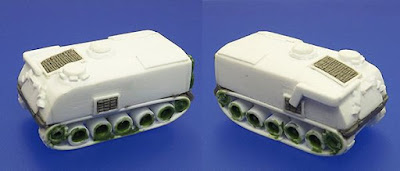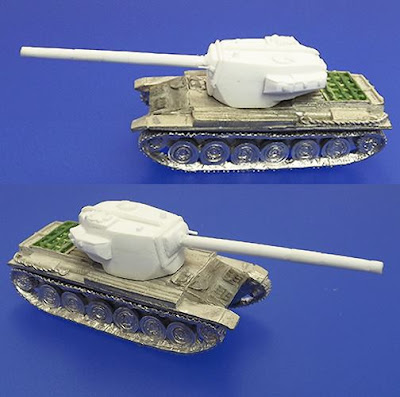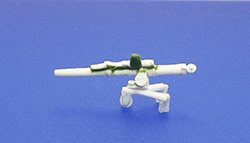Martin has been busily working his way forward from WWII, adding a load of useful items for our upcoming Korean War range and beyond. We'll run through them in designation number order:
The M19 MGMC was an anti-aircraft vehicle, using an M24 Chaffee chassis and mounting a pair of 40mm Bofors guns on it. Produced in 1944 it did see limited service before the war ended as an assault gun and was then used during the Korean War in the same role. Just under 300 were produced in total before it was phased out in favour of the M42 Duster.
Next up we've got the M37 SPG, again taking a Chaffee chassis and this time mounting the 105mm Sherman gun on it. It was designed to replace the M7 'Priest' but was delivered too late to see any action in WWII. It was kept in service through Korea before being retired when the conflict ended. Numbers were a little over 300 for this one.
The M41 Gorilla was another conversion of the useful Chaffee chassis, lengthening it slightly and adding the M1 155mm howitzer. After some modifications to the design, the final version arrived too late for WWII and a planned run of 250 was reduced down to only 85. It was used as a support weapon during Korea, where its mobility was an advantage over the M40 but it suffered from an inferior range. Some were also delivered to the Free French army.
Next up we've got the M42 Duster, another anti-aircraft vehicle which took the same 40mm Bofors turret from the M19 above and mounted it onto the Walker Bulldog hull. 3700 of these were produced from 1952-1960, mainly used by the US but also supplied to a variety of other countries including Austria, Venezuela, Lebanon and Tunisia among others. Whilst this one was too late for Korea, it was used extensively in Vietnam and remained in service in some parts of the world through to the early 1990's.
This pair are the M53 and M55 SPG's, both of which used components from the M47 Patton and then popped either a 155mm or 203mm howitzer on top. Whilst being an awkward looking beast, it was effective at what it did with an impressive range of 17km. This one was again too late for Korea but did see use in Vietnam as well as during the Cold War in the Belgian army, remaining in service until the 1970's.
The M59 APC was brought into service in 1954 as a replacement for the M75 (below). It had the advantage of being amphibious, cheaper to produce and having a lower profile. Over 6000 were produced, being used by the US mainly. It didn't make it to Korea but was used during Vietnam before the development of the M113. After its retirement, large numbers of these were sold off to Brazil, South Vietnam and Turkey among others, with some believed to still be in service today.
The M75 was the precursor to the M59 above and did see service in Korea. This was a larger vehicle than both the M59 and later M113, with a capacity of over a dozen men plus driver. Production reached over 1700 but its shortcomings led to the introduction of the M59 instead. Over 600 were given to the Belgian army who continued to use them into the 1990's.
The Centurion Mk 1 didn't really get chance to see service, with the Mk 2 developed before the Mk 1 had got fully into production but we know of at least one customer who'll want one!
This next Centurion was a stop gap vehicle designed to counter the Soviet introduction of the IS-3. A large 120mm turret was built and placed on the Cent Mk 3 hull, but only one production model was completed before the project was scrapped in 1951. This single 'Conway' vehicle now sits in Bovington tank museum. The gun/turret would later be used for the Conqueror.
The Oxford Tracked Carrier was an early post-WWII British APC and artillery tractor, substantially larger than the 3 ton Universal carrier it was designed to replace. It saw service in the Korean war both as a tractor for the 17 pdr and as an APC. A little over 50 of them saw service.
And finally, we've had a load of requests for this over the years so we've finally produced a 106mm Recoilless! No more cutting down the pieces from the Ontos...! The gun was actually 105mm but was designated 106mm to avoid confusion with the earlier M27 version. That initial M27 saw use in Korea, before the development of this M40 version, which went on to be used all over the world right up to the present day. The difference between the two is slight, mainly a different mount so we'll look at adding the M27 mount at some point in the future.
And phew, that's all of them! Dave's eager to get these moulded up so we might be getting them released sooner rather than later!
Forum Discussion
Pendraken Miniatures











No comments:
Post a Comment